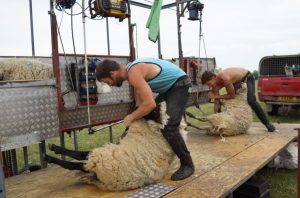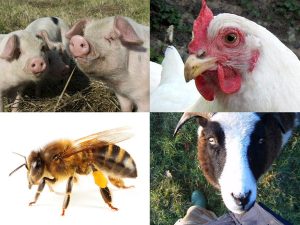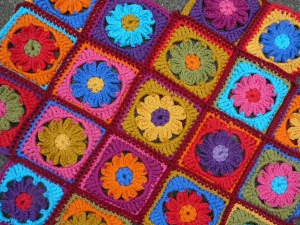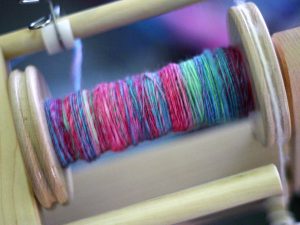Adapted from an original post over at Indie Farmer, founder and editor-in-chief Nigel Akehurst shares his beginner’s guide to lambing as smallholders and sheep farmers prepare for one of their busiest times of the year. Over to Nigel from here.
Growing up on a farm you get introduced to lambing at an early age (yes, that’s me in the photo below, holding a lamb with the rather anxious looking ewe in the background) but for the vast majority of people it’s not something they come across or really understand fully.
The last few years prime time programmes like lambing live and celebrity presenters like Kate Humble have helped broaden the appeal with a main stream audience tuning in to see the realities of sheep farming up and down the country. Since it’s one of the busiest times of year on our farm it’s tradition that my four sisters and I take it in turns to spend weekends and holidays over the 3-4 week period helping bolster the lambing team.

Credit: Indie Farmer
At the time of writing, this was my first as a full-time farmer and with just over a month before our flock of 213 Suffolk and Mule ewes were due to start! Over the following few weeks were were busy preparing for the most important part of the shepherding calendar. For all those novice shepherds or anyone interested in learning more about the process here’s my short beginner’s guide to lambing.
1. Conception or ‘Tupping’
On our farm it all begins in the Autumn when we put our 4 rams in with our flock, a ratio of around 1 ram to 50 ewes. With our ewes and rams in prime condition it doesn’t take long for nature to run it’s course and the rams begin ‘tupping’, as it is known in the sheep world, as demonstrated by our Charolais ram below…

Credit: Indie Farmer
2. Gestation period
Once pregnant the ewes have a gestation period of around 5 months. Having made careful note of the day the rams go in we calculate our lambing start date (which was the 21st of March in the year the original post was written).
3. Lookering
It’s vital to keep tabs on the well-being of your pregnant ewes by ‘lookering’ them on a daily basis to ensure they have plenty of grass, aren’t caught up in brambles or upside down in a ditch. Depending on the weather conditions ‘lookering’ is either undertaken on foot or with the aid of a 4×4 vehicle – such as demonstrated by my sister below.

Credit: Nigel Akehurst on Instagram
4. Feeding
The correct diet is of paramount importance to the health of our flock of pregnant ewes. In addition to moving our ewes regularly to fresh grass, we feed supplementary hay during wet and cold spells and also provide energy blocks in the lead up to lambing to help prevent incidences of twin lamb disease.

Credit: Indie Farmer
5. Scanning
We scan our ewes about 10 weeks prior to their due date to determine our lambing percentage, each ewe is marked up (by spray painting) with a particular colour corresponding to singles (blue), twins (no mark) or triplets (green) and quads (two green dots). The past couple of years we’ve achieved a percentage of around 186% which is fairly good for a lowland farm. A really good percentage is around the 200% or two lambs per ewe. In the year this was written, however, we had to abandon scanning due to stormy weather – so we were be lambing the old fashioned way.

Credit: Indie Farmer
6. Preparing the lambing pens
We lamb both indoors and out in the fields, with the whole flock coming in every evening so we can easily monitor ewes, help difficult lambing’s and minimise mortality rates. A lot of preparation goes into transforming our hay and straw barn into a dedicated sheep maternity ward, with a system of smaller individual pens and larger multiple pens.

Credit: Indie Farmer
7. Easy lambings
When the time comes the majority of our ewes just get on with it, producing healthy lambs either onto a bed of straw (if indoors) or onto grass if they lamb down during the day. Once they have lambed down the ewes then normally ‘mother’ their wet lambs by licking them dry, after which they take to their feet to suck vital colostrum from their mother’s bag.

Credit: Indie Farmer
8. Difficult lambings
Sometimes things don’t go as smoothly and we have to intervene by helping with the delivery. One of the obvious issues can be poor presentation, such as a breach when the lamb is born backwards. To help with the delivery we use a number of lambing aids such as lubricant and ropes.

Credit: Indie Farmer
9. Fostering
Sometimes during difficult births we aren’t able to save the lamb – when it’s a twin the ewe can still raise their other lamb as a single but if it’s a single that loses it’s lamb then we look to foster a lamb from a triplet or quads. The fostering process can be tricky and ewes can often reject the fostered lamb based on the smell. We use a number of tactics to help reduce the chance of this happening such as using the skin of the dead lamb over the foster lamb and applying talcum powder too.

Credit: Indie Farmer
10. Numbering and Ringing
To stay organised and keep track of who belongs to who we number and colour code each ewe and their lambs with spray paint (as demonstrated by number 37 below). To prevent infections we dip the lambs naval in iodine and also ring their tails and balls ready for turning out.

Credit: Indie Farmer
11. Turning out
Once the mother and her lambs are fit and healthy to leave the lambing pens we load them up in a trailer and turn them out in the fields.

Credit: Indie Farmer

Credit: Indie Farmer
12. More lookering
The work doesn’t stop there though – the lambs are still venerable to the elements and predators like foxes. A few seasons ago I noticed a distressed ewe that was missing a lamb. After searching the whole 10 acre field for sometime I managed to find her lamb down a badger hole – luckily the little chap was still alive and I pulled him out, reuniting him with his mum and sibling.

Credit: Nigel Akehurst on Instagram
Nigel Akehurst is Founder & Editor-in-Chief at Indie Farmer, an online lifestyle magazine celebrating independent farming and artisan food culture. After spending the summer of 2014 meeting farmers across the UK, Nigel decided to give up city life to move back to the small family farm in East Sussex to become a beginner farmer himself, whilst continuing to build the Indie Farmer community of readers, writers and contributors. He tweets @IndieFarm and can be found on Instagram @indiefarmer.










1 Comment
A very interesting article of reasonable length – enough to wet the interest without being to onerous! More of these please!